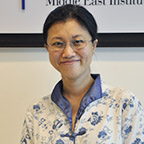- 20 Jul 2017
MEI Arabia-Asia Cluster: The YMCA and Chinese-Arab Labourers in WWI Western Front
(This event is organised by MEI’s Arabia-Asia Research Cluster, as part of its monthly seminar series.)
Abstract
From 1916 to 1920, about half a million Chinese and Middle Eastern laborers in total worked in the construction fields of WWI for the Allied Forces. Hailing from far corners of Asia and Africa, these two groups of laborers encountered each other unexpectedly and directly in the theatres of the Great War. They worked side by side, building roads, digging trenches, unloading ammunition, and cleaning up the battlefields. They also worked behind the battle line, manning transportation, farming agricultural lands, as well as producing weapons in the industrial factories. Cultural and racial diversity shaped their worlds of war and work. Although both known as sturdy and valuable workers, they did not get along with each other. As most of them were unlettered peasants, they were not familiar with each other’s customs and languages. As a result, they often got into fights due to mundane grievances, such as competition for bread or gambling.
To facilitate communication, the Young Men’s Christian Association sent their secretaries to work as interpreters and teachers for the laborers, especially those who worked for the American Expeditionary Forces on the Western Front. They organized classes for basic knowledge such as geography, mathematics, physical education, and simple English. They wrote letters on behalf of the laborers. They also entertained the laborers with tea and music during their free time to prevent them from squandering the hard earned money in gambling. Using a variety of primary sources, this paper examines the cross-racial tensions among subaltern laborers in the throes of the Great War, and the religious and educational roles of the YMCA in enriching the lived experiences of those Chinese and Middle Eastern laborers. I argue that although YMCA officers faced disheartening resistance on the ground, especially from Muslim laborers, their efforts improved social cohesion during wartime crisis and left an often overlooked imprint on the worldviews of subaltern laborers.
About the Speakers

Shuang Wen earned a PhD in Transregional History (modern Middle East and East Asia) from Georgetown University and an MA in Middle East Studies from the American University in Cairo. She also received additional Arabic language certificates from the University of Damascus and Middlebury College. Before switching career to the academy, she was a broadcast journalist for Phoenix Satellite Television InfoNews Channel in Hong Kong (2003-06), covering events in the Middle East, such as the humanitarian crisis during the 2006 Hizbullah-Israel conflicts, and worked as a Chinese-English simultaneous conference interpreter in Beijing (2001-03).




